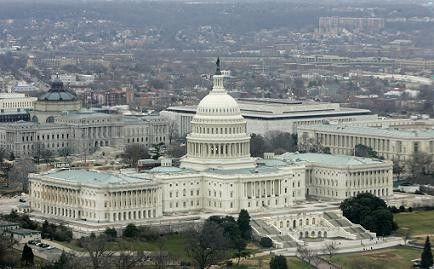Obama, Democrats, GOP at Table Talking
Analysis

Finally, there's a "a ray of light" emanating from Washington -- the debt deal talks may be advancing.
The Obama administration said Saturday afternoon it "strongly supports" a bill being considered in the U.S. House that incorporates both Democrat and Republican ideas, and that would raise the debt ceiling to early 2013. The bill would require two-thirds approval in the Republican-controlled House to pass.
"It is imperative that the United States not default on the nation's obligations," the Obama administration said in a policy statement, Reuters reported. "If the bill were presented to the president, his senior advisors would recommend that he sign it."
Further, top leaders in the Republican Party confirmed that after more than two weeks of acrimony and, arguably, the most heated rhetoric Washington has seen since the 1974 Watergate impeachment process that resulted in President Richard Nixon's resignation, they are now in serious talks with President Barack Obama to raise the debt ceiling and avoid what most Wall Street analysts and economists believe would be a credit market-contracting and economically-damaging U.S. Government default on its debt.
"We now have a level of seriousness with the right people at the table that we needed and thought we had, as the Speaker indicated last week," Senate Minority Leader Mitch McConnell, R-Ky., said at a news conference Saturday afternoon, where he was joined by House Speaker John Boehner, R-Ohio, Reuters reported.
McConnell: There'll be no U.S. Default
Further, when asked whether the United States -- the largest and most technologically-advanced economy in the world -- would default on it debts and whether senior citizens and the U.S. Armed Forces would receive their earned payments, McConnell said a deal would occur.
"Our country is not going to default for the first time in our history -- that is not going to happen," McConnell said, thehill.com reported Saturday afternoon.
McConnell added that he is "confident and optimistic that we can get an agreement in the very near future and resolve this crisis."
Word of the first, substantive, constructive development in the stalemate occurred after a two-day, political slap/slap-back that has characterized this impasse.
After the Democrat-led Senate, as expected, defeated Speaker Boehner's revised debt deal plan in quick order Friday night, the Republican-led House, in a symbolic vote, Saturday voted down 243-173 Senate Majority Leader Harry Reid's, D-Nev., revised debt deal plan proposal, even before the Senate had a chance to review it and vote on it.
That left Washington in a funk, and there's no mystery why: the polarized Democratic and Republican parties had spent two weeks deploying rhetoric and political postures -- achieving no substantive progress toward a bipartisan debt deal -- even as the calendar continued to wind-down toward the Aug. 2 default date.
The optimist would say "it's always darkest before dawn." Unfortunately, it was former China Leader Chairman Mao who also said, "It's always darkest before it's really black."
Fortunately, for the nation, and for the electoral chances of incumbent Congressional Democrats, Republicans and Obama, it appears the two parties are finally ready to end the political posturing, negotiate, find common ground, and then deploy that time-honored American tradition -- compromise -- to forge a bipartisan budget deficit reduction and debt ceiling increase deal that will avoid the dreaded U.S. Government default.
Congress needs to raise the debt ceiling by Aug. 2, when the federal government both runs out of money and loses the authority to borrow more money.
A U.S. Government default -- or even the hint of it -- would force institutional investors to "price-in" the increased risk -- i.e. increase the interest rate it asks to hold U.S. debt.
Further, because the U.S. Government is considered the lowest risk in the world -- those higher interest rate increases -- or increased risk -- would ripple through the financial system -- pushing up interest rates on everything from home mortgages to car loans, credit cards and student loans -- among other destructive consequences.
Political/Public Policy Analysis: As the old saying goes, "fingers are crossed." Word that Obama, Reid, Pelosi, McConnell, and Boehner are now all fully-engaged, at the table, and talking substance is a good sign.
In other words, it sounds like both sides are willing to make compromises to forge a bipartisan deal, which is what's needed, given Washington's divided government. But let's not get ahead of ourselves: until the deal has been negotiated, passed by both chambers, and signed by the president, nothing is achieved.
Even so, based on word of the substantive talks starting late Saturday afternoon, we're lowering the risk barometer, on a scale of 0 to 100 percent, of the likelihood of a U.S. Government default, to 45 percent on late Saturday afternoon, 15 percentage points lower than Saturday at mid-day.
© Copyright IBTimes 2024. All rights reserved.





















